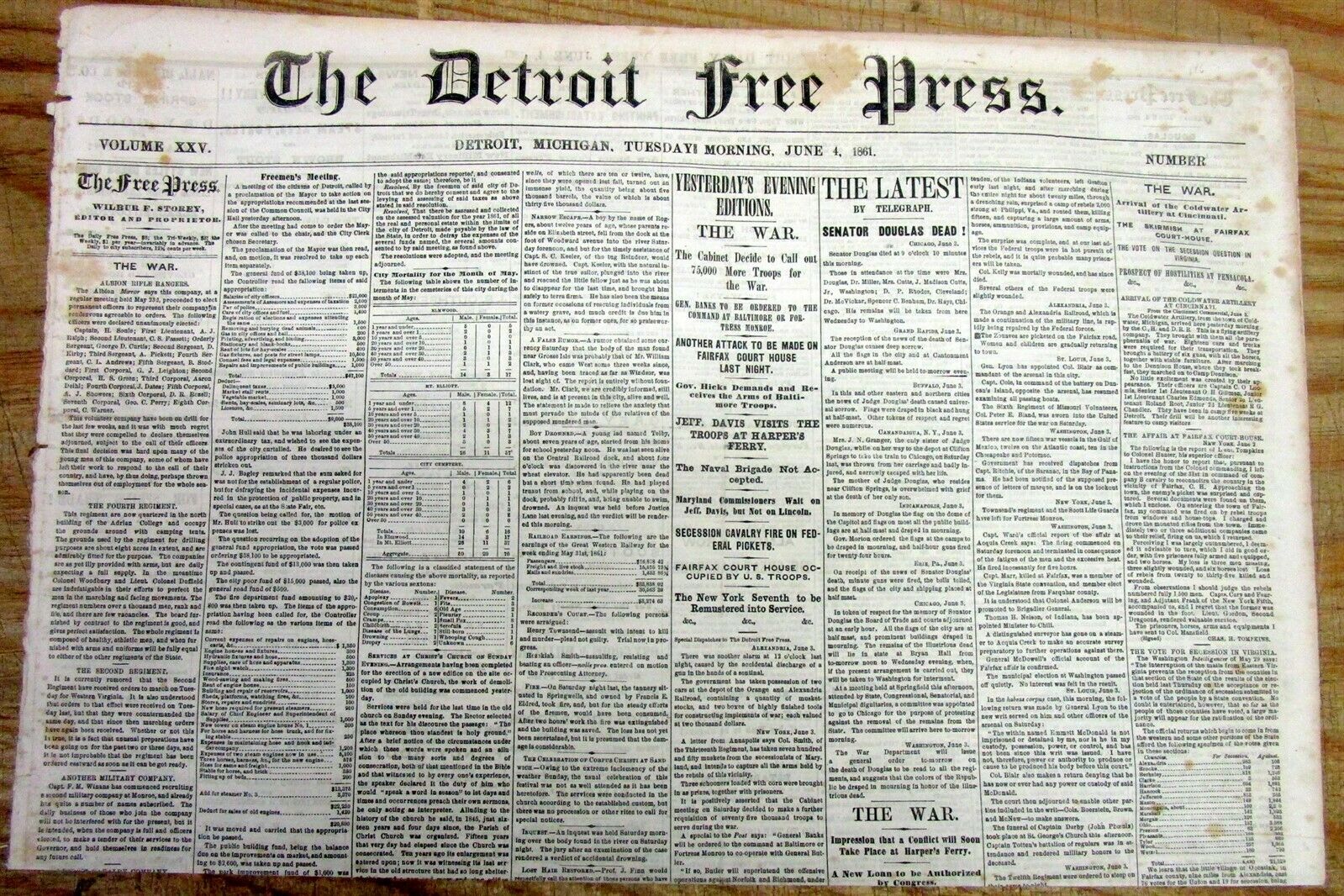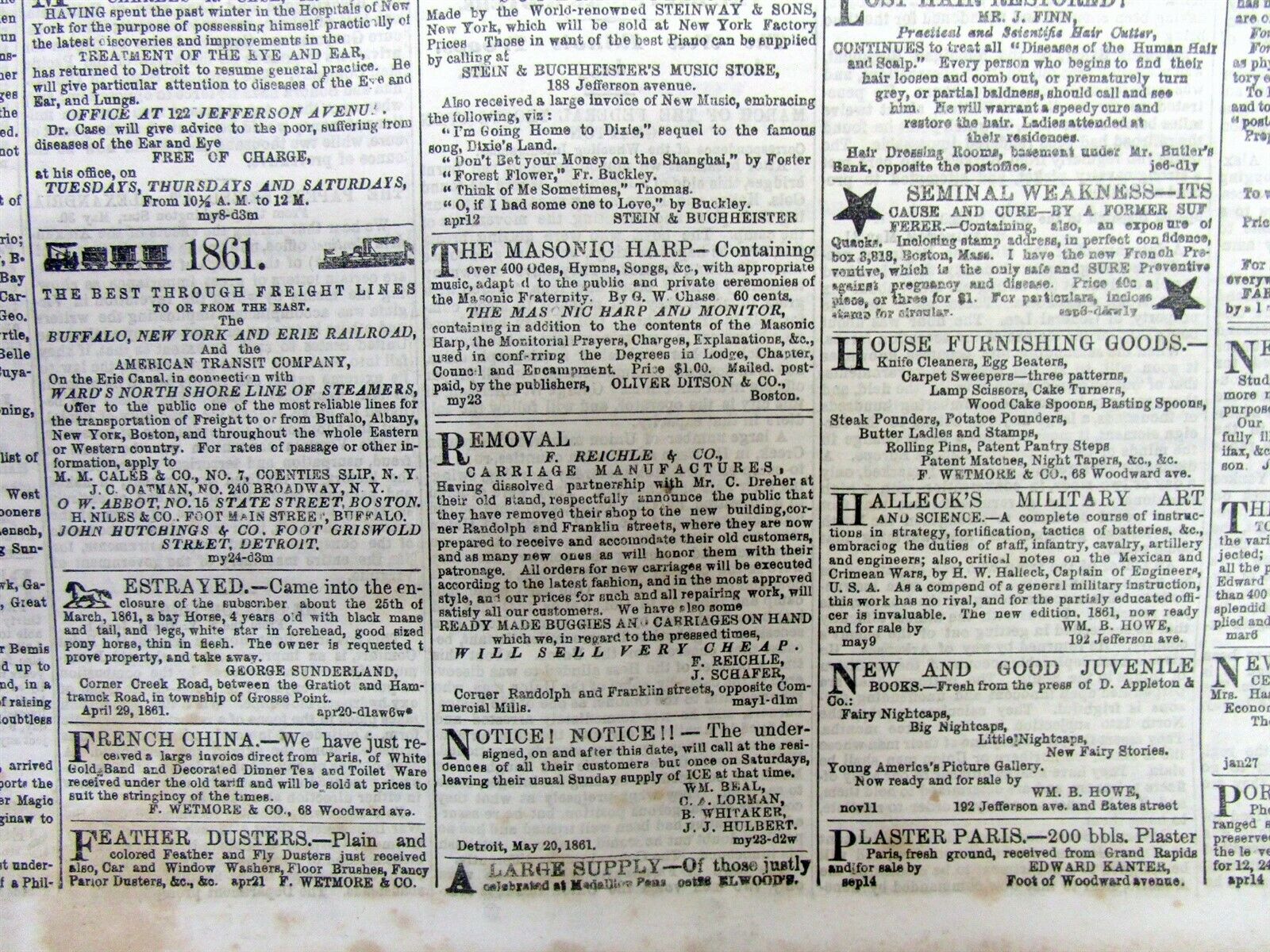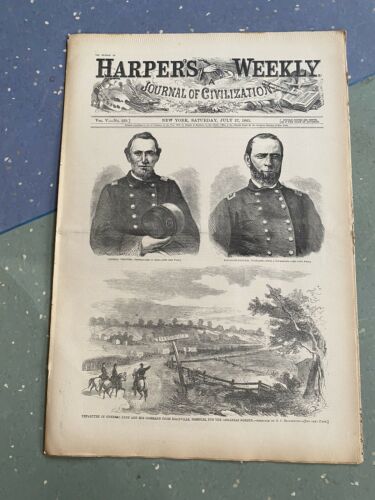-40%
1861 Civil War newspaper annoucing DEATH of STEPHEN A DOUGLAS US Senator of IL
$ 15.83
- Description
- Size Guide
Description
1861 Civil War newspaper annoucing DEATH of STEPHEN A DOUGLAS US Senator of IL1861 Civil War newspaper annoucing the sudden DEATH of STEPHEN A DOUGLAS the US Senator from ILLINOIS and rival of Abraham Lincoln for US President in the election of 1860
- inv # 8K-328
Please visit our
EBAY STORE
for THOUSANDS MORE HISTORICAL NEWSPAPERS for SALE or at auction
SEE PHOTO(s) - COMPLETE ORIGINAL Civil War NEWSPAPER, the
Detroit Free Press
(MI) dated June 4, 1861. This original newspaper contains prominent front page bold headlines: "THE LATEST / By telegraph / SENATOR (Stephen A ) DOUGLAS DEAD !". Breaking news of the
DEATH of STEPHEN A DOUGLAS
, Abraham Lincoln's rival for US Senator from Illinois in 1858 and for the US Presidency in the election of 1860.
Stephen Arnold Douglas (April 23, 1813 – June 3, 1861) was an American politician and lawyer from Illinois. He was one of two Democratic Party nominees for president in the 1860 presidential election, which was won by Republican Abraham Lincoln. Douglas had previously defeated Lincoln in the 1858 United States Senate election in Illinois, known for the Lincoln–Douglas debates. During the 1850s, Douglas was one of the foremost advocates of popular sovereignty, which held that each territory should be allowed to determine whether to permit slavery within its borders. Douglas was nicknamed the "Little Giant" because he was short in physical stature but a forceful and dominant figure in politics.
Born in Brandon, Vermont, Douglas migrated to Jacksonville, Illinois, in 1833 to establish a legal practice. He experienced early success in politics as a member of the Democratic Party, serving in the Illinois House of Representatives and various other positions. He resigned from the Supreme Court of Illinois upon being elected to the United States House of Representatives in 1843. Douglas became an ally of President James K. Polk, and favored the annexation of Texas and the Mexican–American War. He was one of four Northern Democrats in the House to vote against the Wilmot Proviso, which would have banned slavery in any territory acquired from Mexico.
The Illinois legislature elected Douglas to the United States Senate in 1847, and Douglas emerged as a national party leader during the 1850s. Along with Henry Clay, he led the passage of the Compromise of 1850, which settled some of the territorial issues arising from the Mexican–American War. Douglas was a candidate for president at the 1852 Democratic National Convention, but lost the nomination to Franklin Pierce. Seeking to open the west for expansion, Douglas introduced the Kansas–Nebraska Act in 1854. Though Douglas had hoped the Kansas–Nebraska Act would ease sectional tensions, it elicited a strong reaction in the North and helped fuel the rise of the anti-slavery Republican Party. Douglas once again sought the presidency in 1856, but the 1856 Democratic National Convention instead nominated James Buchanan, who went on to win the election. Buchanan and Douglas split over the admission of Kansas as a slave state, as Douglas accused the pro-slavery Kansas legislature of having conducted an unfair election.
During the Lincoln–Douglas debates, Douglas articulated the Freeport Doctrine, which held that territories could effectively exclude slavery despite the Supreme Court's ruling in the 1857 case of Dred Scott v. Sandford. Disagreements over slavery led to the bolt of Southern delegates at the 1860 Democratic National Convention. The rump convention of Northern delegates nominated Douglas for president, while Southern Democrats threw their support behind John C. Breckinridge. In the 1860 election, Lincoln and Douglas were the main candidates in the North, while most Southerners supported either Breckinridge or John Bell of the Constitutional Union Party. Campaigning throughout the country during the election, Douglas warned of the dangers of secession and urged his audiences to stay loyal to the United States. Ultimately, Lincoln's strong support in the North led to his victory in the election. After the Battle of Fort Sumter, Douglas rallied support for the Union, but he died in June 1861.
Douglas was struck by illness in May 1861 and was confined to his bed. Though his supporters initially expected a quick recovery, Douglas contracted typhoid fever and suffered from several other afflictions.
He died on June 3, coincidentally on the same day as the Battle of Philippi, the first skirmish of the American Civil War.
On June 4, Secretary of War Simon Cameron issued a circular to Union armies, announcing "the death of a great statesman ... a man who nobly discarded party for his country.
Very good condition. This listing includes the complete entire original newspaper, NOT just a clipping or a page of it. STEPHEN A. GOLDMAN HISTORICAL NEWSPAPERS stands behind all of the items that we sell with a no questions asked, money back guarantee. Every item we sell is an original newspaper printed on the date indicated at the beginning of its description. U.S. buyers pay priority mail postage which includes waterproof plastic and a heavy cardboard flat to protect the purchased item from damage in the mail. Upon request by the buyer, we can ship by USPS Media Mail to reduce postage cost; however, please be aware that USPS Media Mail can be very slow in its time of transit to the buyer. International postage is quoted when we are informed as to where the package is to be sent. We do combine postage (to reduce postage costs) for multiple purchases sent in the same package.
We list thousands of rare newspapers with dates from 1570 through 2004 on Ebay each week. This is truly SIX CENTURIES OF HISTORY that YOU CAN OWN!
Stephen A. Goldman Historical Newspapers has been in the business of buying and selling historical newspapers for over 50 years. Dr. Goldman is a consultant to the Freedom Forum Newseum and a member of the American Antiquarian Society. You can buy with confidence from us, knowing that we stand behind all of our historical items with a 100% money back guarantee. Let our 50+ years of experience work for YOU ! We have hundreds of thousands of historical newspapers (and their very early precursors) for sale.
Stephen A. Goldman Historical Newspapers
has been in the business of buying and selling historical newspapers for over 50 years. We are located in the charming Maryland Eastern Shore town of OXFORD, Maryland.
Dr. Goldman is a consultant to the Freedom Forum Newseum and a member of the American Antiquarian Society. You can buy with confidence from us, knowing that we stand behind all of our historical items with a 100% money back guarantee. Let our 50+ years of experience work for YOU ! We have hundreds of thousands of historical newspapers (and their very early precursors) for sale.
We invite customer requests for historical newspapers that are not yet located in our extensive Ebay listing of items. With an inventory of nearly a million historical newspapers (and their early precursors) we are likely have just the one
YOU
are searching for.
WE ARE ALSO ACTIVE BUYERS OF HISTORICAL NEWSPAPERS, including large and small personal collections, bound volumes, significant individual issues, or deaccessions from libraries and historical societies. IF YOU WANT TO SELL, WE WANT TO BUY !!!
Powered by SixBit's eCommerce Solution











